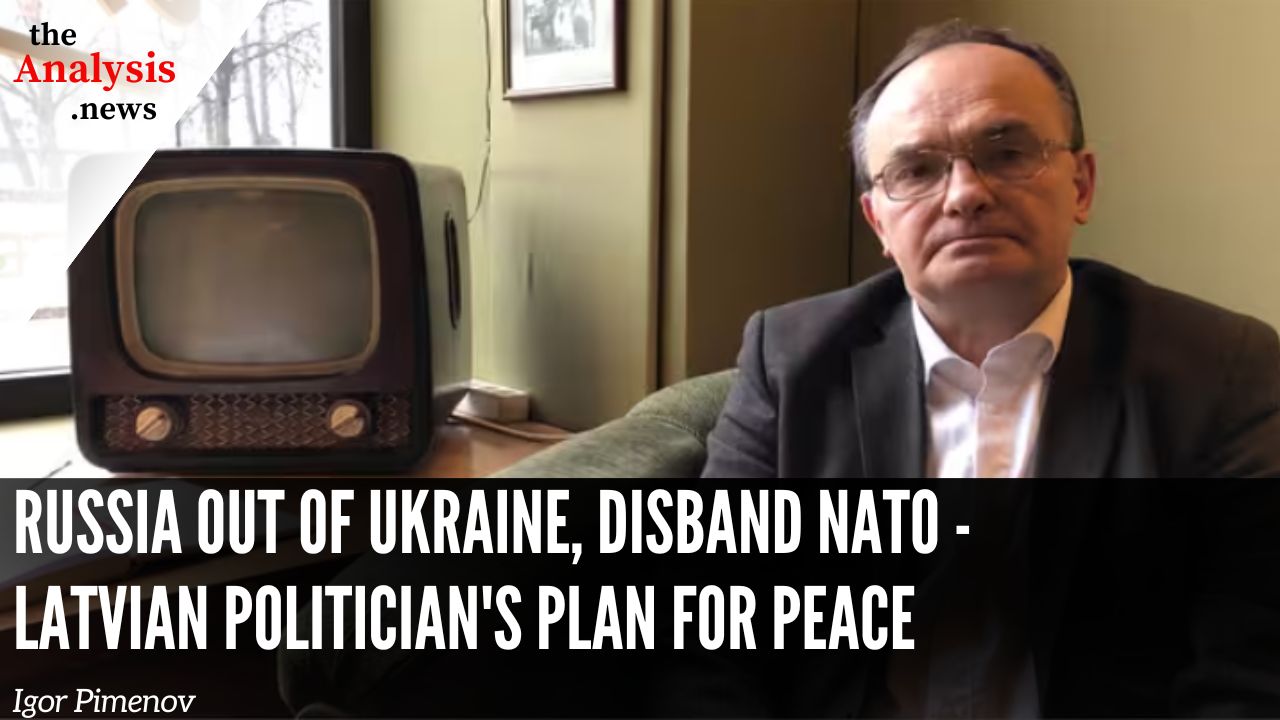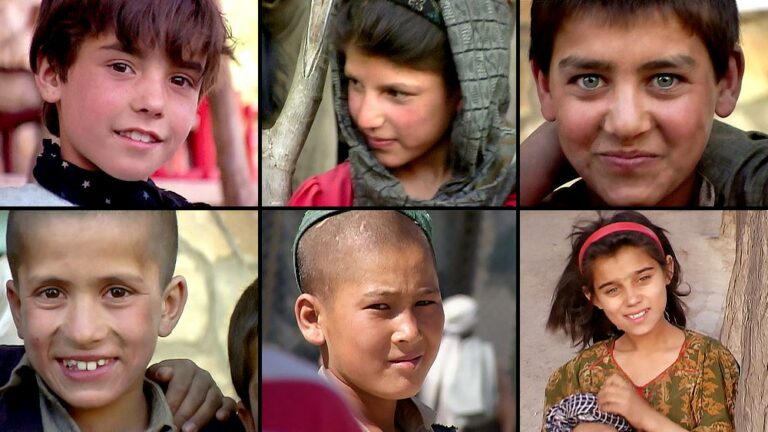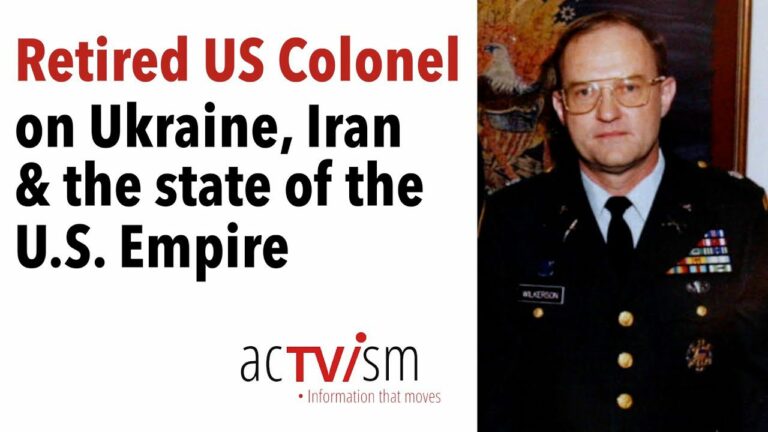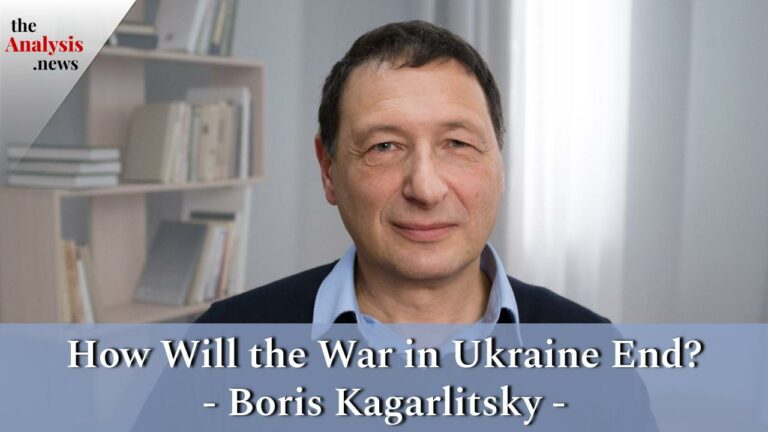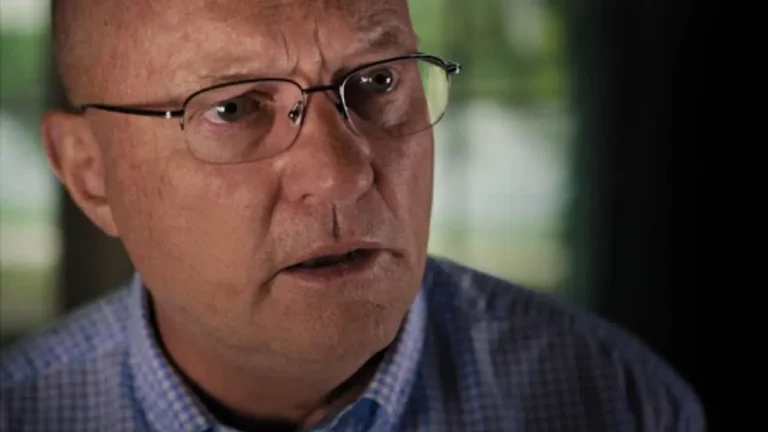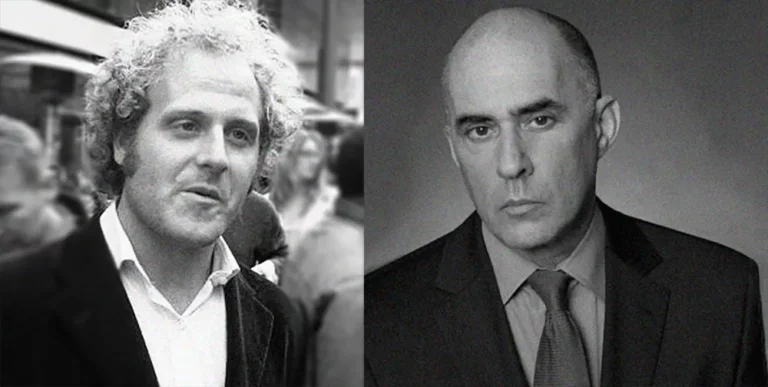Russia Out of Ukraine, Disband NATO – Latvian Politician’s Plan for Peace
As the war of attrition between Russia and Ukraine continues to exact a catastrophic death toll for civilians and military forces alike, the prospect of a lasting peace remains elusive. Latvian politician Igor Pimenov denounces President Vladimir Putin’s invasion of Ukraine, calling it a colonial war that also adversely affects the Russian population. Pimenov lays out his proposal for a multilateral peace agreement between Ukraine, Russia, and its European neighbors.
Talia Baroncelli
Hi, I’m Talia Baroncelli, and you’re watching theAnalysis.news. I’m very excited to be joined by a Latvian politician Igor Pimenov. Today, he’ll be discussing his views on a potential plan that would ensure peace between the Russian Federation and Ukraine, so you won’t want to miss that talk.
If you enjoy this content and would like to help us out, you can give us a boost by going to our website, theAnalysis.news. Hit the donate button at the top right corner of the screen and make sure you get onto our mailing list; that way, you always get an update every time a new episode is published. Feel free to share the show with your family and friends. Like and subscribe to the show on YouTube or other podcast streaming services such as Apple and Spotify. See you in a bit with Mr. Pimenov.
Joining me now is Igor Pimenov. He is a member of Concord, which is a social democratic party parliamentary group running for the European Parliament elections in Latvia. He was a member of the Riga city council in Latvia between 2005 and 2009 and served as a member of the Saeima, the Latvian national parliament, between 2009 and 2022.
He’s still a member of Concord, and of course, he was born in Latvia, where he graduated from the Department of Physics and Math at the State University of Latvia in 1975. As a Marxist, he’s been politically active ever since being in the Soviet Union and being in what is now current day Latvia. In 1996, he founded an NGO that works to preserve general education in Russian for the Russian-speaking minority in Latvia. So, thank you very much for joining me today, Mr. Pimenov.
Igor Pimenov
Thank you for the invitation, it’s kind of you.
Talia Baroncelli
I wanted to start out with the war in Ukraine. On February 24, 2022, Russia invaded Ukraine. I first would like to ask you what your assessment is of this war and why you think President Vladimir Putin launched it in the first place.
Igor Pimenov
I regard this war as a colonial one. I have several times repeated it during different interviews and still emphasize my stance here. I guess I would say it’s even an imperialistic war.
Ukraine was part of the Soviet Union, one of the legal constructions of the USSR, the western part of the great Russian tsarist empire before 1917. Later the war for independence began in the territory of contemporary Ukraine, which resulted in the proclamation of Soviet power on that territory of modern Ukraine. Later Ukraine became one of the 15 republics of the Soviet Union, but still for the central power in the USSR, Ukraine remained, although one of the 15 republics of the Soviet Union, one of those which provided much resources to the economic development of the country the Soviet Union. It also was a great human resource, and also ideological and intellectual resource. We have a very confused mixture of dependence of the Soviet Union on the former part, which really was, let’s say, the margin of the Russian empire. On the one hand or the other hand, Ukraine provided much resources to the development of the Soviet Union, and also administrative resources, as many leaders and frontmen servants in the administration of the Soviet Union originated from Ukraine, from Kyiv, from [inaudible 00:04:22], and from Odessa.
As a man who was born in the Soviet Union 71 years ago, I still regard Ukraine as part of my former motherland, which disappeared in 1991, as you know. Looking at what happens in contemporary Russia now, I conclude that there are many legal and illegal forces, and many people still regard Ukraine as something that is a part of Russia that should be withdrawn back to the motherland rather than make its own way to Europe, choosing its way of making its economy in the way it likes, sharing the same values, which is usual for Europe, but it’s not usual for the Russian Federation.
On the other hand, I should admit that Ukraine is regarded by political parties in different parts of the world i.e. the United States and Western Europe, as something that can be used as a way to challenge the future development, political development, and strengthening of the Russian Federation, which became an independent democratic state in the early ’90s, though facing huge problems, sometimes very devastating problems for common people. These problems are still on the agenda for contemporary Russia. Therefore, this competition for influence in Ukraine has been on the agenda since the first day of the collapse of the Soviet Union.
Judging the war, the invasion of the Russian Federation in Ukraine, I say I condemn this invasion. I regard it as aggression, as a clear cut violation of international law. I stand for the territorial integrity and sovereignty of Ukraine. I believe that after an independent investigation, war criminals must be punished regardless of what particular country they originate from. That is my position, and I would like to emphasize it.
I would like to mention my personal attitude. I was born, as I’ve told you, in the Soviet Union, and the Ukrainians are as close to me as Russians, Moldovians, Latvians, Lithuanians, Estonians, and all other people belonging to different ethnic groups from the former Soviet territory. Therefore, to launch the war against the people which belong to the same community is more than criminal. It’s a catastrophe. This catastrophe will badly damage the coming future of the Russian people.
A reasonable, political, and diplomatic solution should be found soon. This problem cannot be solved with warfare. It will make these problems even more difficult to find a solution. I hope I managed to explain my attitude and the reason why I’m so active in judging this matter now.
Talia Baroncelli
Well, at the moment, it seems like neither side is really interested in a negotiated settlement. Ukraine has just recently received a huge aid package, a military aid package from the United States. Russia is currently making some more gains in the Kharkiv region, which is on the Ukrainian eastern borders with Russia. It seems like the war can continue for years at the current pace and have huge casualties.
Many military experts would say that Russia is doing much better, and its economy is doing better despite the Western sanctions on Russia. The IMF, for example, last month said that this year alone, the Russian economy will grow by 3.5%, which is actually more than the growth rates of France, the UK, and Germany. There are still huge exports of oil. Even though it’s difficult for Russia to perhaps get some military equipment into the country, in general, their economy is quite strong, and they’ve been able to isolate themselves from some of the other problems of the global economy.
Given these factors, what would you say is necessary to come to a negotiated settlement? Perhaps first you could explain what your idea would be to achieve peace in the region. You speak about a multilateral agreement in which Russia would withdraw its forces from Ukrainian territory, including from Crimea, and in return, NATO would have to be disbanded. So why don’t you explain that plan of yours?
Igor Pimenov
I’m going to be attentive to detail in order to not make mistakes. I’d like your listeners to understand what I’m going to propose. First of all, I would say that all this military assistance which is provided by the government of the United States, of course, it fuels the resources, the arsenal of Ukraine. Please take into account the internal onset. The war that began was not a war of military resources, guns, airplanes, and machine guns. It’s a war of infantry, of artillery, of human beings who are involved in the warfare. Ukraine, in these terms, is not as large as Russia. The human resource of the Russian Federation is incomparably larger on the one hand.
On the other hand, the damages and costs to Ukraine over the last two years and a little bit more are enormous. Ukraine lost a good deal of its GDP. It’s been reduced to, I can be mistaken, more than 20% compared to the year 2022. In these terms, even though the United States and other allies of Ukraine, which stood on the side of Ukraine after 24 February 2022, are doing their best to make Ukraine’s army stronger, it will not solve the solution. Ukrainians themselves keep on participating in this war and nobody will assist them in the field.
I think that the way which is now taken by both parties involved, from the Russian side and from the Ukrainian side, leads to a threshold. It makes no sense to make stronger efforts for greater victories in the battlefield. It will cause only more people to perish. I support those oppositional politicians in the Russian Federation, for example, who say that the first step that should be done is stopping the fire. Otherwise we shall lose tens of thousands of young males, people, strong, clever, that could contribute to the development of these countries, both in Russia and Ukraine.
On the other hand, all the proposals for a possible armistice sometimes are senseless, as they will be used by both sides, but first by the Russian Federation for further strengthening of their military might, rather than for further development in the way of making peace stronger. If we really want to find a solution, we should do our best to make such an agreement that could feed all parties involved, to make all interests of those parties which are involved in this conflict. I do not mean only Ukraine and the Russian Federation. I also mean the countries, those states, those groups of influence in the West, which are interested, more or less, sometimes financially and in different ways, to calm down and not participate in developing this conflict in the future. Therefore, I believe that what is really necessary is to sign a multilateral, single-package agreement, which is constituted of four pillars. These four pillars have to be committed to a single package, so simultaneously.
Firstly, I think that the withdrawal of troops of the Russian Federation to the borders of 1991, that is the border of Ukraine when it proclaimed independence. Secondly, a treaty between Russia and Ukraine should be signed; I will talk about this a little bit later. Thirdly, the dissolution of NATO and dismantling of its military bases in Europe and around the world. Fourthly, collective guarantees of peacekeeping for all states in Europe that constitute a new Helsinki Agreement or Helsinki Accords, let’s name it Helsinki II. The agreement has to be simultaneously beneficial for all states, as I said, so for all parties involved.
It’s very important that all parties should be interested for their own reasons perhaps, but still, the ultimate result should be beneficial for everybody. It’s not possible to leave anybody in a sense of defeat and bitterness. For example, if Russia achieved a so-called victory on the battlefield, Ukraine would never forgive either Russia or the Western countries that it lost its territory; it lost its sovereignty, perhaps even within a smaller territory of the country after the eastern part was seized by the Russian Federation. We should find a solution that makes all parties feel fed up.
It’s quite clear that everybody wants Russia to withdraw its troops to the borders of 1991, that is the borders of Ukraine, which it had right before the proclamation of its independence, the borders of the former Ukrainian Soviet socialist republics within the territory of the USSR. Everybody understands this requirement and I shall not speak about it longer, but it’s necessary to explain to people living outside Europe, perhaps even in western Europe. It’s very important to consider the future of the North Atlantic Treaty Organization.
Let us recall that NATO was organized, was arranged, was established, and was fed by many, many countries all over the world around the Atlantic Ocean in order to counteract a possible aggression of the Soviet Union. After the Cold War was over it looked like the reasons for abolishing NATO as well as the Warsaw Pact was quite evident. Still, NATO remained. I regard NATO, for the time being, as a kind of, let’s say, rudiment of such a Cold War epoch. So, I guess it would be quite reasonable. There is no peril; there is no challenge for the world that could prove that NATO is necessary. I understand that smaller countries, for example, such countries such as Latvia, where I reside, where I was born, and still stay here, are interested in NATO to be a kind of umbrella that would make their life safe. Latvia is located right at the border of the Russian Federation, and they believe Russia can attack Latvia at any moment. Therefore, it’s quite necessary to achieve an agreement, a collective with guarantees for all countries which are located in Europe, not only for Ukraine, but also for the eastern countries, eastern countries of Europe, Latvia included, but also for the old Western democracy residing from Great Britain to Italy, Spain, and Greece. I think it’s quite reasonable. I think this solution will make all parties satisfied.
Also, I would like to emphasize that, please remember that one of the participators of the Cold War was China. It is considered that in the Cold War the United States and the western bloc won. The Soviet Union collapsed and therefore, the Western cities, the Western countries, and the Western states are those who are the winners. But please remember that China, who was a participant of the Cold War as well, did not lose. Do you regard China as a loser? Please look at its economy, its social possibilities, and its competitiveness in the international market. China is one of the, let’s say, broad tigers that are going to develop even stronger some 20 or 40 years later if nothing changes in the economy. All of the world will be divided into two parts, China and others, and nobody will be interested. Is there a difference between a Frenchman, a Finnish, or a Spaniard? So everybody in this world, which is called usually a western one, will regard themselves as one which counteracts China. I think this interaction should not be a military one, it should be competitive.
What I want to say is if we achieve such a multilateral agreement in Europe, ensuring security for all states in the European continent, it will make the competition and the challenges that are brought forward in relations with the Chinese People’s Republic even softer. It will bring peace not only to Europe but also to the whole of the world. After that, I guess Europe and the United States of America will open a new era in relations with China. Therefore, it’s very important, while looking for a solution to the Ukrainian crisis, to find such a solution that will open new space for the development of the whole of the world, peaceful development of the world. It’s very important. I would guess, once again, not only for Ukraine or for some other countries that are more or less involved in this war but also for the whole of the world and the countries that do not participate in this war or provide the provision of any commodities to Ukraine at all. That is my position. That is my proposal. I’m sorry if I spoke too long.
Talia Baroncelli
No, not at all. I wanted to pick up on a few important points that you made. You did address the fact that despite conscription in Ukraine, Ukraine is having a very difficult time filling its military ranks. A lot of younger men have fled Ukraine, and it seems like some, either very, very young men or else older men over the age of 50, even, are even fighting in the Ukrainian army because there aren’t enough men between the ages of 18 and 30 or so to fight. The death toll, in general, has been horrible in Ukraine. Ukraine doesn’t have the human resources, as you said, as Russia does. This is a really important factor to keep in mind.
You did say that this current or your proposed multilateral agreement could be fashioned along the lines of a Helsinki Agreement. You’re referring to an agreement that was initiated during the time of the Soviet Union under [Leonid] Brezhnev. Could you explain briefly what that agreement was and why you think it would be something to emulate?
Igor Pimenov
I would not mention all the details of the Helsinki Accords, but what is important for me is that the final result of these accords was signed by all the countries of the European continents, together with the United States and Canada. So, it meant that it was favorable for all countries on the European continent, regardless of their social or political structure.
I remember quite well, on the western part, it was necessary. It was important to make the Soviet Union open its borders and to soften its human rights politics, which at that time was sharply criticized. I agree that criticism was fair. It was one of the solutions in order to make people residing in the Soviet Union feel better and enjoy human rights opportunities after 1975, when that agreement was signed.
Now, I guess it’s possible as well. Please, just now, after I try to explain those four pillars of this multilateral single package agreement, it’s very important to mention that one of the key moments, one of the key prerequisites of this agreement, is the treaty between Ukraine and Russia. When I speak about this treaty, otherwise, Ukraine will not be satisfied with any Helsinki. What Ukraine wants is sovereignty and territorial integrity. This sovereignty and territorial integrity must be acknowledged by the Russian Federation, the sovereignty within the borders of 1991.
Next, it’s necessary to provide personal immunity to everybody who resided in Ukraine, in the territory of Ukraine before the war and by the day of the signing of this agreement. Also, property of all kinds has to be safeguarded, restored, and reimbursed if lost. Russia has to pay its reparations, war reparations. Next, in the regions of Ukraine where people are identifying themselves as Russians reside, a dual Ukrainian and Russian citizenship has to be possible. The Russian language has to acquire the status of an official language, or at least education at all levels has to be ensured in the Russian language along with the Ukrainian language. Russian speakers; about 80% of Ukrainian residents speak Russian at home, only Russian, or Russian along with Ukrainian. The position of the Russian language should be one of the crucial points in this treaty between Russia and Ukraine. But please mention this balance between the sovereignty on the one part and the integrity of Ukraine as part of the European Union, perhaps in the future on the one side. And then all these details, let’s say in hyphens between Ukraine and Russia, can balance each other and make the world in Ukraine fairer and just. I believe that those who indicate that Ukraine is a part of Europe where the Russian language is attacked are vulnerable. Those hoaxes in contemporary Russian politics will be calmed down. Also, it will be fair.
I’ve been to Ukraine many times. I studied in Ukraine for some months, in 1977, right after university. I understand those people who stay there, they have nothing against Russia. They have nothing against the Russian Federation or the Russian language, at least those who live in the central part of Ukraine. I understand that Ukraine is different. There is a western Ukraine; there is an eastern Ukraine. This discrepancy of different Ukraine’s perhaps makes this conflict even more dangerous for the future of this country. But still, I guess the treaty between Russia and Ukraine, in a nutshell, makes the whole of this multilateral single package agreement tangible and prospective.
Talia Baroncelli
I do have a follow-up question, though, because you’re asking for the current Russian leadership to give up quite a lot, at least according to their perspective. I’m not endorsing that perspective. I’m just saying I’m sure they would be happy if NATO were to disband, and perhaps they would consider that to be less of a threat on their borders, but if you’re saying that this is a colonial war and that there are such great ties between the Russian Federation and Ukraine, as well as huge resources in the Donbas region and in other areas of the eastern part of Ukraine, then why on earth would they want to give any of that up? If they’re interested in maintaining this colonial war, if their economy is still doing quite well, what sort of incentive is there for them to enter into this agreement? Of course, there would be peace, and NATO would be disbanded. With the current Russian leadership, how do you see them getting to that place?
Igor Pimenov
Yes, the colonial character of this war is something that I insist on. I guess it’s one of the internal springs of this activity of the Russian Federation administration. Certainly, it is on the other part. So please consider the Russian Federation as one of the world’s geographical maps, a huge country, an enormous country with a very long border.
The logic of contemporary foreign policy is that the density of foreign policy of any state is proportionate to the length of the borderline. So, the borderline of the Russian Federation is larger than any other country in the world. Let’s step into the position of a Russian Federation leader for a second. They look at the borders of the Russian Federation in the West, and they see that some 1000 km from it are a lot of different military bases that originate from NATO. A NATO that plans to withstand possible activities and military hostile activities on the former Soviet Union. As soon as the Soviet Union does not exist any longer, those bases are still active, they develop, they provide, they support the military and economy of different European states, which in turn are very strong economically.
Even the Netherlands, for example. Although it’s a small country compared to any other country in Eastern Europe, it is still one of the constructions of NATO, as well as Norway, Turkey, and even Greece. Russia should take into consideration these particular objective circumstances for planning its security development in future. If NATO is abolished, if the bases are dismantled, there is no– For those people who listen attentively to the arguments of the Russian Federation, there are no serious arguments as to why Russia should regard Ukraine as a menace if NATO were to dismantle its military bases in the future. If NATO is outside the agenda of contemporary European politics, there are quite new conditions, quite new arguments, even for the society of Russia, for those common people who really are convinced that NATO is an enemy, it’s a sleeping enemy, it can attack the Russian Federation at any moment, and what they have done in Ukraine caused the reasonable activities of the Kremlin administration. So we should stop this situation, making all the suspicions vanish, both in the East and in the West of Europe. Therefore, it’s very important, let’s say, to take into account this position.
What I haven’t mentioned yet during our conversation is that nobody cancelled the doctrine of Paul Wolfowitz, which was arranged right after the collapse of the Soviet Union. He was the United States Undersecretary of Defense for policy. He was a gentleman whose invention and political project were taken into action by the administration of President Clinton. Although it was softened, at least it was proclaimed it was softened, nobody said that the United States does not regard itself as the pillar of the contemporary world, as a military and economic gendarme of the world.
This doctrine is still considered one of the challenges not only for the Russian federation, but also other countries. Some countries regard this doctrine as the basis for security. On the other part, these doctrines sometimes can be considered as hostile for the sovereignty of different countries. Russia is among them.
I think that the present and the next administration of the United States must talk about the very fact of a cancelation of this doctrine in the future, proclaiming that never, ever the United States of America will regard any region of the world as something which the United States should provide their domination in the future, would be very important. All this aligns with the necessity of the dissolution of NATO, at least to the extent that I wanted to explain to you.
Talia Baroncelli
On that point, the United States has demonstrated many times its disregard for what it terms the rules-based international order. There’s a difference between the discursive function of the so-called rules-based international order and the actual body of international norms and laws that have been instituted ever since the Second World War. The United States, with the invasion of Iraq and Afghanistan, etc., and also, I should say, with its supply of weapons to Israel, even though Israel has been undoubtedly committing war crimes and acts in violation of international law, the United States, in doing so, has demonstrated its appetite for being a hegemonic power and disregarding international norms. That’s always a huge factor when discussing Russia’s aggression and Russia’s contraventions of international law. There has to be some sort of consequence for the United States to ever expect Russia to fall in line and to respect Ukraine’s sovereignty.
Igor Pimenov
I’m sorry if I interrupted you, but I wanted to mention one particular event, which you mentioned as well. By that, I mean the aggression against Iraq by the administration of George Bush. It was really something that confused the liberals in the Russian Federation and all over the world. Nobody believed that such a country as the United States would break all its oaths and obligations concerning the implementation of international law.
Whoever there could be in Iraq, who is Saddam Hussein, whether it was his responsibility for the attack on the Trade Center in New York or not, but still to invade the country, to kill many people during the first day of the aggression, it was something against the ideals which were proclaimed by the United States of America at that time. Later, in different administrations of the United States, Barack Obama made it their homework to improve and fix all these mistakes made by the previous administrations. But still, we can judge that, in a nutshell, the doctrine of Wolfowitz is still in action.
Therefore, sometimes it’s not easy to speak with people who stand in favor of the Russian Federation’s military politics in Ukraine now. They say that all that happens is the continuation of the first years of this century. It’s a continuation of the consequences of the Iraq aggression, American aggression in Iraq. It looks tricky, but there is some sense in these arguments as well.
Once again, I believe that I would not like to divide the responsibility, let’s say, to separate responsibility between different states concerning the war in Ukraine. It is entirely the responsibility of the Russian Federation and the leadership of it.
Some people say that Putin is going to restore the Soviet Union. It’s not true. Putin is going to restore the tsarist empire of the last century, of the last half of the 19th century, of the Tsar Alexander III. He speaks about the Soviet Union and his experience, achievements, history, and all that the Soviet Union and people residing in the Soviet Union did in the 20th century with great negligence, I would say. He is not the adherent of the Soviet Union of the restoration of the USSR. He is the adherent of the restoration of the tsarist Russian empire. This is wrong. It makes Russians suffer. Perhaps not, as Ukrainians are suffering now but suffer in the future. Therefore, I guess this war should be stopped with all the instruments that are in the hands of contemporary diplomatic and peacekeeping people all over the world. Even our conversation is one of these episodes as well.
Talia Baroncelli
You’ve just been watching part one of my discussion with Latvian politician Igor Pimenov. Join us for part two, where we’ll be discussing the risk of nuclear war, given the ongoing war between Russia and Ukraine.
Podcast: Play in new window | Download
Igor Pimenov is a Latvian Russian politician. He is a member of Harmony and a deputy of the 12th Saeima.
